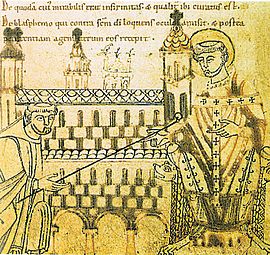Saint Anno
| Saint Anno of Cologne | |
|---|---|

Archbishop Anno instates Erpho, first abbot of Michaelsberg Abbey, 12th century manuscript
|
|
| Archbishop | |
| Born |
c. 1010 Altsteußlingen, Swabia |
| Died |
4 December 1075 Siegburg |
| Venerated in | Catholic Church |
| Canonized | 1183 by Pope Lucius III |
| Major shrine | Michaelsberg Abbey, Siegburg |
| Feast | 4 December |
Anno II (c. 1010 – 4 December 1075) was Archbishop of Cologne from 1056 until his death. From 1063 to 1065 he acted as regent of the Holy Roman Empire for the minor Emperor Henry IV. Anno is venerated as a saint of the Catholic Church.
He was born to the edelfrei Steusslingen family at Altsteußlingen (near Ehingen) in Swabia, and was educated in Bamberg, where he subsequently became head of the cathedral school. In 1046 he became chaplain to the Salian emperor Henry III, and accompanied him on his campaigns against KIng Andrew I of Hungary in 1051 and 1052. The emperor appointed him provost at the newly erected Cathedral of Goslar in 1054 and Archbishop of Cologne two years later. Due to his dominant position at the imperial court, Anno was able to influence other appointments. Anno's nephew, Burchard, was made Bishop of Halberstadt in 1059, and in 1063, his brother, Werner, became Archbishop of Magdeburg.
According to contemporary sources, Anno led an ascetic life and was open to reform. Nevertheless, for the interests of his archdiocese he turned out to be an ambitious and even unscrupulous ruler. His plans to seize the prosperous monastery in Malmedy, challenging the authority of the Imperial abbey of Stavelot-Malmedy, caused much controversy and ultimatively failed. On the other hand, he founded the Benedictine abbey of Michaelsberg, modelled on the Italian Abbey of Fruttuaria, which soon evolved to a centre of the Cluniac Reforms in Germany.
...
Wikipedia
